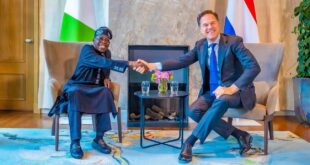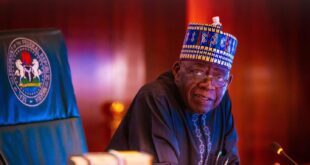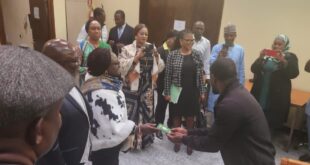The power-sharing deal signed in 2018 between President Salva Kiir and opposition leader Riek Machar has already been extended twice – in May 2019 and November 2019 – delaying the formal end to a war that has killed nearly 400,000 people, displaced millions, and pushed tens of thousands to the brink of starvation. The new deadline is 22 February. Unresolved key issues could still prevent South Sudan’s rival parties from meeting the looming deadline to form a coalition government, while citizens of the long-suffering country fear renewed violence and war. Alice Mogwe, president of the International Federation for Human Rights, in this opinion piece outlines what the EU can do to move the peace process forward in South Sudan.
——–
Nearly a decade has passed since South Sudan became the world’s youngest nation, yet peace remains a broken promise its people.
President Salva Kiir and opposition leader Riek Machar have until 22 February to deliver on this promise. So far, they have failed to make substantial progress in implementing the revitalised peace agreement which they signed in 2018, despite two deadline extensions.
Ordinary South Sudanese citizens rightly fear that violence could return as a result of the inability of their leaders to put aside their political and personal interests for the good of their country.
Compared with other crises, South Sudan may not seem like a top political priority for the European Union.
Yet, top EU leaders have met with African Union heads of state in Addis Ababa this month to declare their wish to prioritise EU-Africa relations. South Sudan should be a top focus.
Despite all the devastating sexual violence, hunger, and corruption created through years of conflict, South Sudan is one crisis where a solution may be in sight – and where quick action by the EU could make the difference to help push the country over the line to peace.
The EU and its member states should recalibrate its approach to South Sudan to boost those who are willing to compromise for peace and to stop those who are derailing it.
South Sudan has plenty of people who are derailing the peace. Recently I was a judge for a unique award ceremony called the Spoilers of Peace Awards.
They were not meant to recognise exceptional achievements, but rather the indefensible obstruction by individuals and entities whose actions have kept the peace from taking root in South Sudan.

While the EU, for example, recognises brave human rights defenders with the Sakharov Prize, there has not been enough exposure for those who continue to obstruct the peace for their gain.
The ‘winning’ spoilers were announced this week in Nairobi. President Salva Kiir was recognised as the “Top Overall Spoiler of the Peace” for playing a leading role in causing widespread suffering to the South Sudanese people, and for showing a stubborn unwillingness to compromise on significant elements in the peace agreement.
We also recognized Akol Koor Kuc, a shadowy figure who heads the National Security Services, as “Top Spoiler of Human Rights” for overseeing a campaign of brutal violence, kidnappings, arbitrary detention, and torture.
We also ‘awarded’ entities such as Uganda, who borders South Sudan, and who has turned a blind eye to illicit funds flowing out of South Sudan via their banks and to illegal weapons flowing in via their borders.
Petronas, an international oil company with significant business in South Sudan, was recognised for committing grave human rights violations.
South Sudanese citizens participated at considerable risk in the public nomination process for these awards.
They know that the only reason these spoilers have wielded disproportionate influence over their country is that they have remained mainly unnamed and therefore face no real consequences for their behaviours.
In participating, South Sudanese expect regional leaders in Africa, and the international community as a whole, to make it clear to the spoilers of peace that business-as-usual will no longer be acceptable.
The way for the EU and its member states to make a difference in South Sudan is to honour the risk people took to nominate peace spoilers by holding the latter to account. They can do this in three ways.
Three-step solution
First, the EU can expose the spoilers: to single out these individuals and entities for obstructing the peace process and enabling conflict in South Sudan, and warn them that they can no longer benefit from the war in the shadows.
Second, they can stop the spoilers, by implementing restrictive measures, including targeted sanctions, against those who continue to undermine the peace process. This action should include individuals, institutions, and companies linked to human rights abuses, corruption, and illicit finances.
Third, the EU can outsmart the spoilers by applying maximum pressure on South Sudanese parties to resolve outstanding issues which are critical to the peaceful formation of an inclusive transitional government and the maintenance of the ceasefire.
That means working with South Sudanese civil society to broker compromises, taking a comprehensive approach to transitional justice including steps to establish criminal accountability, and ensuring transparent governance and financial management to end the corruption which is bleeding the country’s economy dry.
It also includes working with banks, commodity traders and insurance companies who deal with South Sudan to condition their engagement on compliance with South Sudanese law and an end to abuses.
The deadline for peace is fast approaching in South Sudan. The EU has a unique chance to make a real difference, to stand with South Sudanese citizens to finally deliver the promise of peace to the youngest nation in the world.
Alice Mogwe is president of the International Federation for Human Rights and founder and director of DITSHWANELO – The Botswana Centre for Human Rights.
 THE AFRICAN COURIER. Reporting Africa and its Diaspora! The African Courier is an international magazine published in Germany to report on Africa and the Diaspora African experience. The first issue of the bimonthly magazine appeared on the newsstands on 15 February 1998. The African Courier is a communication forum for European-African political, economic and cultural exchanges, and a voice for Africa in Europe.
THE AFRICAN COURIER. Reporting Africa and its Diaspora! The African Courier is an international magazine published in Germany to report on Africa and the Diaspora African experience. The first issue of the bimonthly magazine appeared on the newsstands on 15 February 1998. The African Courier is a communication forum for European-African political, economic and cultural exchanges, and a voice for Africa in Europe.























